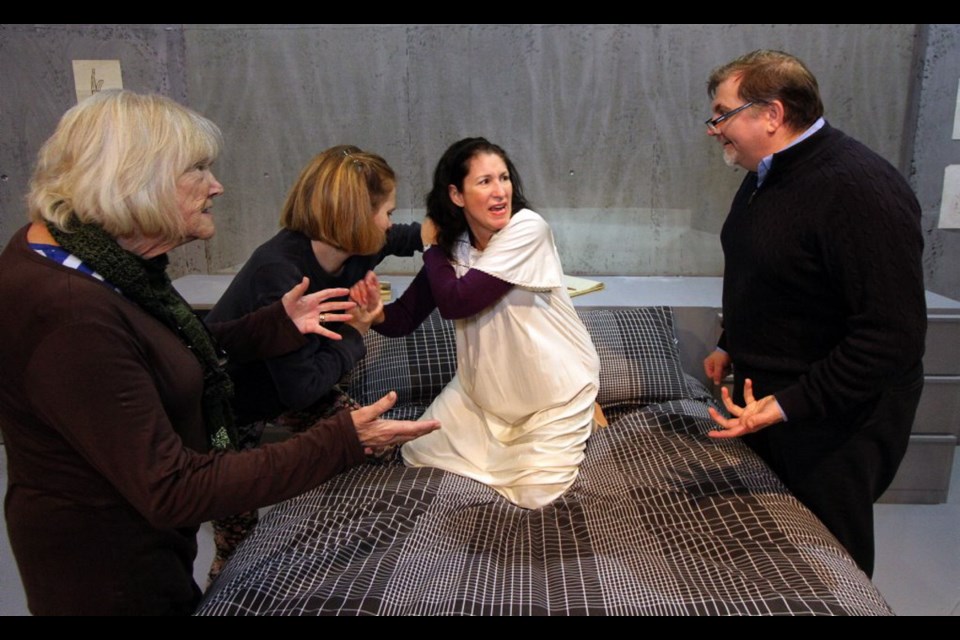REVIEW
What: That Face
Where: Langham Court Theatre
When: To Feb. 2
Rating: Four stars (out of five)
- - -
That Face opens with two girls torturing their slumped, Valium-stuffed classmate. Technically, it’s hazing, but the girls’ slap-happy cruelty suggests an American military torture exercise.
What’s even more disturbing is the drama’s second scene. A couple groggily wakes up in bed in dishabille. She strokes him affectionately. Are they lovers? She apologizes: “Forgive me and I will be good.”
Turns out they are mother and son. Yuck.
British enfant terrible Polly Stenham penned That Face when she was just 19 years old. The play, a remarkable achievement for a teenager, caused a stir when it opened in London. It’s not hard to see why. A pill-popping drunken neurotic, the mother Martha (Kirsten Van Ritzen) follows the tradition of those spectacularly damaged female characters in theatre. Stenham had obviously been impressed by the other Martha in Who’s Afraid of Virginia Woolf. There are also touches of Blanche in A Streetcar Named Desire, and even Laura and Amanda from The Glass Menagerie.
Everyone, with the possible exception of a largely absent father (he vamoosed for Hong Kong), is messed up. Daughter Mia (Melissa Taylor), physically abandoned by her dad and emotionally ignored by her mother, seems a nice, mixed-up girl whose neglected upbringing guarantees a lifetime of psychiatrist’s bills.
Yet she’s comparatively normal next to brother Henry (Michael Bell), the one who woke up with mommy. Ill advisedly, Henry dropped out of art school to devote his life to taking care of Martha, who really ought to be in rehab.
Their hothouse relationship has simmering incestuous overtones, although they likely haven’t consummated anything physically. However, Martha depends on him as one might a husband or lover (at one point, she gives him a possessive love bite) — and it’s certainly not doing sensitive Henry any favours.
The Victoria Theatre Guild — once a bastion of British comedies and Agatha Christie-style mysteries — has taken a chance with That Face. Even Lisa Preston’s excellent set pulls no punches, a cement-like tomb that suggests the prison-like stasis of Henry and Martha’s stalled lives.
Well directed by Judy Treloar, who has obviously advised her cast to “go for it,” That Face is a slice of disturbing theatre that demands — and even dope-slaps — the theatregoer into paying attention to the horror wrought by dysfunctional families.
I’m not convinced this piece carries the thematic resonance and richness of Stenham’s influences (Edward Albee, Tennessee Williams and Eugene O’Neill). But if this is the kind of rip-roaring theatre 19-year-olds are producing, well, then sign me up.
On Thursday night, it was the performances of young actors that most impressed. Bell’s performance as Henry was remarkably raw and accomplished — he succeeded in reaching into the dark, conflicted heart of this badly broken youth. Bell is obviously a big talent with a future in acting.
Equally impressive is Taylor (her scenes with Bell were the evening’s best). Taylor, too, captured the truth of her character, Mia, in a tremendously convincing manner. It was a skilled performance.
As Izzy, an obnoxious schoolmate (and hazing-scene instigator), Kathryn Taddei overacted somewhat. The over-the-top freneticism of her performance was distancing. Yet it’s obvious that Taddei’s instincts as an actor are good; she, too, has real potential.
Martha, a spectacular train-wreck of a human being, is the juiciest role. And Van Ritzen, a solid actor, did it justice. Her portrayal emphasized Martha’s eccentricity over the character’s inherent nastiness, making her more of a Blanche DuBois than, say, Liz Taylor’s corrosive Martha in Who’s Afraid of Virginia Woolf.
The approach makes the character more sympathetic, thus perhaps allowing the audience an easier entry into a tough play. Then again, a nastier Martha would make the mother’s rejection of her daughter more believable.
Michael King, as the father, was stiffish at times, but believable in a confrontational dinner scene with his daughter. Viewed through a semi-transparent screen (one of the fake concrete walls), this scene is very cleverly lit.
Don’t be put off by the grim subject matter; this production is well worth seeing. It’s vigorous, exciting theatre — and some of the acting is extremely good.
A final note: I would really encourage audience-goers to check to make sure their mobile phones are switched off during theatre performances. One of the climactic final scenes in this play was accompanied by about 10 phone rings. Such behaviour is terribly rude and inconsiderate of both actors and audience.
